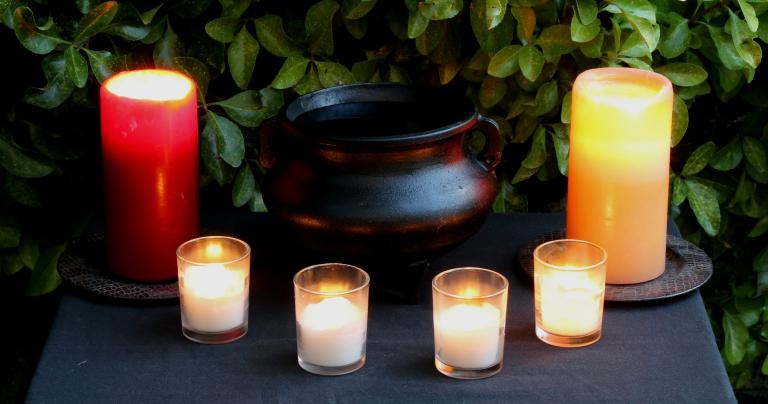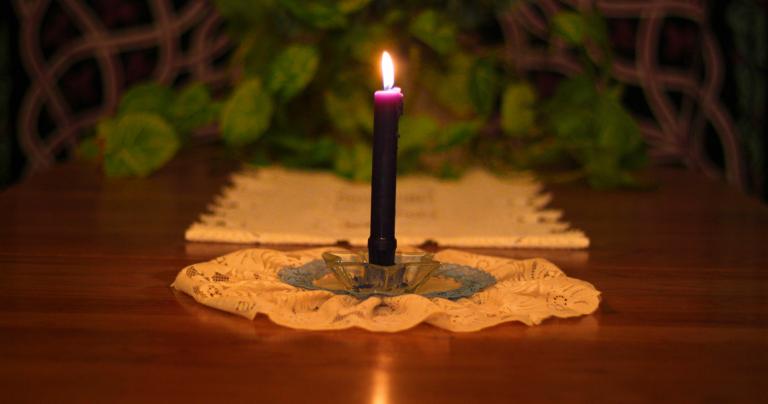If you’re a leader in a Pagan group or if you have a public presence as a Pagan, sooner or later you’re going to get an e-mail, a phone call, or an in-person visit from someone in distress. Someone who’s God-bothered, or who had a magical working go badly, or whose atheo-materialist worldview was shattered when someone parted the Veil and they saw something they can’t unsee. They’re hurting, and they’re looking to you for help.
Why you? You gave somebody the impression you know what you’re doing. You seem like you’d be receptive and understanding. Or one of the Gods decided you needed to up your game. How and why isn’t all that important. What’s important is that someone is having a spiritual crisis and they’ve got nowhere else to go, so they came to you.
At the very least, you owe these people basic hospitality: a welcoming hand, a listening ear, and a reassuring voice. You may feel like you’re unqualified to help them beyond that, and that’s entirely possible. It’s also entirely possible that despite your very real shortcomings, you’re the best they’re going to find.
What do you do when you have to be the spiritual emergency room?
Listen
Once you’re past the basic hospitality, shut up and listen. Don’t offer advice, don’t ask clarifying questions, don’t start trying to figure it out in your head. Let them talk. Let them tell their story in their own way. Make notes – mentally or on paper – if necessary, but give them your full and undivided attention.
When they’re done talking, then you can go back and ask questions. But at this point, you need to be asking to learn, not to lead them to a conclusion. You don’t know enough yet to come to a conclusion.
Listen.
Do not assume mental illness
Religious and magical professionals are not mental health professionals. Do not try to diagnose mental illness.
My mental health professional friends tell me that delusions can only be measured by how much they match shared consensus reality within a person’s culture. If you think someone is deluded, remember that what’s normal for Wiccans isn’t normal for Presbyterians, and vice versa.
Pagans regularly report experiences ranging from ordinary phenomena with unexplained causes to total possession by deities. We have experiences of every type of spiritual or Otherworldly being known to humanity. We work magic and we get results – sometimes unexpected results. None of these things indicate mental illness.
If they tell you about religious experiences that fit into the “normal for Pagans” category then you should not assume they’re mentally ill, even if you’ve never had those particular experiences yourself. You shouldn’t assume that even if you think those experiences aren’t possible.
There’s a reason why they came to you instead of a psychologist. They’re looking for religious or magical help… and they’re probably afraid a psychologist is going to jump to a conclusion of mental illness (although it can be both). They need you to reassure them that what they’re experiencing isn’t out of the realm of possibility. They need you do tell them they’re not going crazy.
If your best judgement is to refer them to a mental health professional, then do it. But if what you hear is normal for Pagans – even if it’s not exactly typical – tell them they’re not going crazy and start looking for religious and/or magical answers.
People in spiritual distress may not have the vocabulary to precisely describe what’s happening
As we practice longer and deeper, and as we talk with others doing the same, we start to develop our own religious and magical jargon – language those who come to us in distress may not understand.
“Ground and center? What does that mean?”
“What’s the difference between an amulet and a talisman?”
“What do you mean ‘banshee’? I saw a screaming ghost.”
As you’re listening, understand they may not have the vocabulary to precisely describe what’s happening. So they grab familiar words that are close. Your job is to translate, not to interject with a lesson on modern Pagan terminology.
Remember that experiences are always real, but interpretations may be more or less accurate. Listen for the facts of the story, and try to separate them from places where your guest may have jumped to a conclusion – no matter which words they’re using to describe it.
Provide spiritual first aid
If the core of the person’s request is “make it stop” or “how do I turn it down?” there are a few basic things you can do, or teach your guest how to do.
Most Pagans’ first suggestion is “ground and center.” That’s a good and helpful thing that should be part of everyone’s daily spiritual practice. Regular grounding and centering can help you develop the strength you need to handle strong spiritual encounters. But in the moment that’s probably not the best first aid.
Cover your head. Use a scarf, pull up your hood, put on a baseball cap. Sometimes religious headcovering is cultural, but other times it’s to put a barrier between you and the rest of the world… or I should say, worlds.
Wear protective amulets. In this case, an amulet is simply any physical object that provides protection. Some materials have that as a natural property (such as iron or garlic), while others have been magically charged to provide it.
Practice shielding. There are numerous ways to shield. I draw power up from the Earth and down from the Sky, gather it in my core, and then project it around me like an energetic eggshell. I do this every morning, and again during the day if things get rough. It helps. A lot.
There are other things that can be helpful, including creating wards and calling spiritual allies for assistance. But those tend be a little more involved. If you need to provide magical first aid, help the person cover their head, give them a protective object to wear, and walk them through basic shielding.
Practice good discernment
You practiced good hospitality, you were a good listener, and you provided magical first aid. If all has gone well, you’ve stopped the metaphysical bleeding. So far so good.
Now it’s time start addressing the core issues. And that begins with figuring out what the core issues actually are.
Is a God claiming someone and won’t take no for an answer? Is an angry ancestor inserting themselves into someone’s life? Perhaps someone broke the old clichéd rule about not summoning what you can’t banish? Curses are rare, but they do happen. The possibilities are endless.
There is no diagnostic flowchart for spiritual emergencies. You’ve got to walk through the discernment process on your own. Listen to your guest. Figure out what they’re trying to tell you even if they don’t have the words to describe it. Consider every possibility – including the possibility of mundane causes. Decide what’s most likely, but don’t rule out other possibilities until you can rule them out with certainty.
Only when you can figure out what’s going on can you start to think about what to do about it.
Listen for matters out of your area of expertise
There are two main ways you can do a disservice to someone who comes to you for spiritual emergency care. The first is to turn them away because you don’t think you could possibly know enough to help them. The second is to assume you can handle anything, whether it’s in your area of expertise or not.
If a God has claimed you I can probably help, depending on how well I know the particular deity and Their pantheon. If you’re trying to clean up a spell gone wrong, I’m not the best but I’ll do. But if you’re being harassed by a folkloric being (for lack of a better word) from Southeast Asia, I’m probably not going to be a lot of help.
Call in more knowledgeable practitioners as necessary. If you don’t know who to call, ask around.
This especially true if what you’re dealing with is culturally sensitive. I’m not talking about cultural appropriation. But some cultures have established ways of dealing with certain magics and spirits, and if you operate within that system things will go much better than trying to power through with techniques foreign to that culture. If somebody comes to me with a problem that has roots in Vodun, I’m going to call one of my friends who are practitioners in that tradition. Not because “white people shouldn’t do Vodun” but because I don’t know much of anything about Vodun and I’m not going to pretend that I do.
The limits of our obligations
If you’re a Pagan leader or a public Pagan of any kind, people in need will find you. Or they’ll be sent to you. You are of course free to disagree with me, but I believe we have an obligation similar to an emergency room: to provide urgent spiritual and magical care to the limits of our expertise and resources.
We are not, however, automatically obligated to provide on-going counseling, teaching, or magical interventions. And we are certainly not obligated to provide it free of charge.
What you do after providing first aid is up to you. If it’s in your area of expertise and if you make a connection with the person in question, perhaps you continue working with them. If it’s not something you do well, if your plate is already full, or if the person is difficult to work with, point them in a good direction and wish them well. Your life, your service, your call.
But never forget that while you can provide guidance, you cannot “fix” anybody’s spiritual problems for them. They will fix them for themselves, or they won’t be fixed. Medical doctors are infamous for acting like they’re Gods – we know we’re not.
Can you do this? If not, learn now
Does reading this post scare you? Are you in a position where people are likely to come to you for help, even if they haven’t yet? Do you think you probably couldn’t handle it?
Better start studying. Better start practicing. Better start building a network of priests, witches, diviners, and other magical folks who can help you learn – and who you can refer people to when necessary. It would help if you found a couple Pagan-friendly mental health professionals too – sooner or later you’re going to need to refer someone to them.
Emergency room doctors have medical training, internship, and residency. By the time they’re working on their own they’re confident they know what they’re doing. Christian priests and ministers have their own training, including pastoral care.
Pagan religious experts and specialists rarely have anywhere close to this level of training. Perhaps someday we will. But the spiritual emergencies won’t wait for that day. Let’s prepare as best we can, and then do our best to help those who come to us now.



















